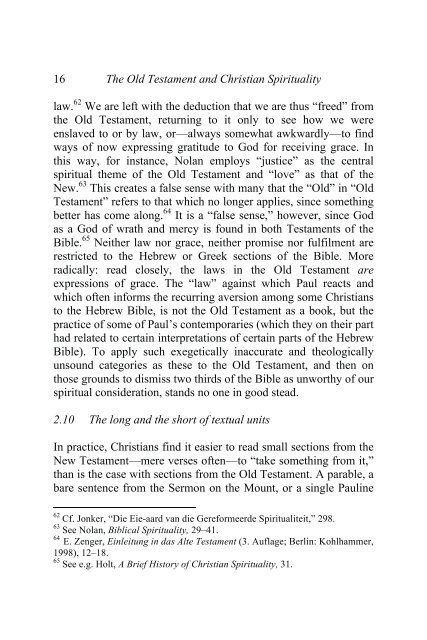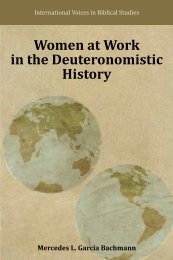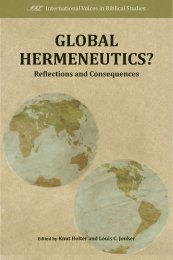The Old Testament and Christian Spirituality - International Voices in ...
The Old Testament and Christian Spirituality - International Voices in ...
The Old Testament and Christian Spirituality - International Voices in ...
You also want an ePaper? Increase the reach of your titles
YUMPU automatically turns print PDFs into web optimized ePapers that Google loves.
16 <strong>The</strong> <strong>Old</strong> <strong>Testament</strong> <strong>and</strong> <strong>Christian</strong> <strong>Spirituality</strong><br />
law. 62 We are left with the deduction that we are thus “freed” from<br />
the <strong>Old</strong> <strong>Testament</strong>, return<strong>in</strong>g to it only to see how we were<br />
enslaved to or by law, or—always somewhat awkwardly—to f<strong>in</strong>d<br />
ways of now express<strong>in</strong>g gratitude to God for receiv<strong>in</strong>g grace. In<br />
this way, for <strong>in</strong>stance, Nolan employs “justice” as the central<br />
spiritual theme of the <strong>Old</strong> <strong>Testament</strong> <strong>and</strong> “love” as that of the<br />
New. 63 This creates a false sense with many that the “<strong>Old</strong>” <strong>in</strong> “<strong>Old</strong><br />
<strong>Testament</strong>” refers to that which no longer applies, s<strong>in</strong>ce someth<strong>in</strong>g<br />
better has come along. 64 It is a “false sense,” however, s<strong>in</strong>ce God<br />
as a God of wrath <strong>and</strong> mercy is found <strong>in</strong> both <strong>Testament</strong>s of the<br />
Bible. 65 Neither law nor grace, neither promise nor fulfilment are<br />
restricted to the Hebrew or Greek sections of the Bible. More<br />
radically: read closely, the laws <strong>in</strong> the <strong>Old</strong> <strong>Testament</strong> are<br />
expressions of grace. <strong>The</strong> “law” aga<strong>in</strong>st which Paul reacts <strong>and</strong><br />
which often <strong>in</strong>forms the recurr<strong>in</strong>g aversion among some <strong>Christian</strong>s<br />
to the Hebrew Bible, is not the <strong>Old</strong> <strong>Testament</strong> as a book, but the<br />
practice of some of Paul’s contemporaries (which they on their part<br />
had related to certa<strong>in</strong> <strong>in</strong>terpretations of certa<strong>in</strong> parts of the Hebrew<br />
Bible). To apply such exegetically <strong>in</strong>accurate <strong>and</strong> theologically<br />
unsound categories as these to the <strong>Old</strong> <strong>Testament</strong>, <strong>and</strong> then on<br />
those grounds to dismiss two thirds of the Bible as unworthy of our<br />
spiritual consideration, st<strong>and</strong>s no one <strong>in</strong> good stead.<br />
2.10 <strong>The</strong> long <strong>and</strong> the short of textual units<br />
In practice, <strong>Christian</strong>s f<strong>in</strong>d it easier to read small sections from the<br />
New <strong>Testament</strong>—mere verses often—to “take someth<strong>in</strong>g from it,”<br />
than is the case with sections from the <strong>Old</strong> <strong>Testament</strong>. A parable, a<br />
bare sentence from the Sermon on the Mount, or a s<strong>in</strong>gle Paul<strong>in</strong>e<br />
62<br />
Cf. Jonker, “Die Eie-aard van die Gereformeerde Spiritualiteit,” 298.<br />
63<br />
See Nolan, Biblical <strong>Spirituality</strong>, 29–41.<br />
64<br />
E. Zenger, E<strong>in</strong>leitung <strong>in</strong> das Alte <strong>Testament</strong> (3. Auflage; Berl<strong>in</strong>: Kohlhammer,<br />
1998), 12–18.<br />
65<br />
See e.g. Holt, A Brief History of <strong>Christian</strong> <strong>Spirituality</strong>, 31.




